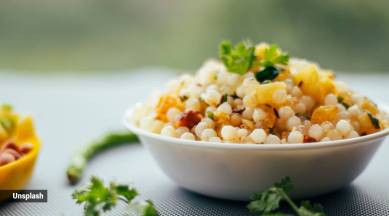
[ad_1]
Krish Ashok stated that whereas there are a number of movies highlighting the dangerous results of maida, sabudana appears to have quietly escaped all consideration

Sabudana, often known as tapioca pearls, is a broadly well-liked and liked meals merchandise, particularly amongst Indians who take into account it a really perfect meals alternative throughout fasts. Many folks respect sabudana for its fast and straightforward preparation, making it a handy choice for meals and snacks. With sabudana being gluten-free, it’s believed to be appropriate for people with dietary restrictions and is taken into account extraordinarily wholesome and nourishing.
But, is it actually wholesome? Krish Ashok, writer of Masala Lab: The Science of Indian Cooking, doesn’t imagine so! “Did you know that sabudana is a healthy and nutritious food traditionally eaten during fasts? Did you also know that absolutely nothing in that previous sentence was true? For starters, it’s not healthy,” he began out saying in an Instagram publish.
Admitting that he loves sabudana and that it’s scrumptious and completely okay as a part of an in any other case balanced weight-reduction plan, however it’s extremely ultra-processed starch and nothing else. “If you are fasting, it makes little sense to eat a carbohydrate bomb that will spike your blood sugar. Secondly, it’s not even traditional. Sabudana was introduced in the 1940s and 1950s in India. It is originally from East or Southeast Asia,” Ashok stated.
You have exhausted your
month-to-month restrict of free tales.
To proceed studying,
merely register or check in
Subscribe to learn on
Select your plan
All-Access
Access to premium tales
Digital Only
Access to premium tales
This premium article is free for now.
Register to proceed studying this story.
This content material is unique for our subscribers.
Subscribe to get limitless entry to The Indian Express unique and premium tales.
This content material is unique for our subscribers.
Subscribe now to get limitless entry to The Indian Express unique and premium tales.
The knowledgeable added that boba or bubble tea makes use of that very same starch. “And here’s the best part — it’s not even what you think it is. Many brands of sabudana will call it sago which used to be the source of starchy pearls. But during World War II, sago was difficult to source and some entrepreneurs in Salem, Tamil Nadu, decided to use tapioca which was commonly grown in Kerala and Tamil Nadu to make the same starchy balls. Since then, almost all sabudana is made from tapioca, not sago. So, sabudana is delicious but it is not healthy, not traditional, unsuitable for fasting, and not sago,” Ashok shared.
The writer stated that whereas there are a number of movies highlighting the dangerous results of maida, sabudana appears to have quietly escaped all consideration. “It is as ultra-processed as maida is and contains insignificant protein (0.2 per cent) in comparison to maida (10-12 per cent) and is pretty much all starch. And yet, it is regularly touted as some kind of superfood and is regularly consumed as ‘vrat’ food,” he added.
Agreeing, purposeful Nutritionist Mugdha Pradhan, CEO and Founder, iThrive stated, “Sabudana is a highly refined form of starch that is obtained from the roots of the Cassava or Sago plant. Due to the refinement, it is rapidly absorbed in the blood and spikes our blood sugar significantly. It is a very high glycemic food i.e. has a very high GI index,” including that these sorts of meals needs to be averted by folks with diabetes and different metabolic well being points like hypertension, weight problems, and coronary heart illness.
“If you don’t have any metabolic health issues or other health conditions associated with blood sugar regulation, then you can enjoy sabudana occasionally as part of a balanced diet,” she added, sharing that what is nice about sabudana is because it’s refined, it doesn’t comprise any fibre or different plant antinutrients. “Thus, it is easy on the gut and provides quick energy without affecting the gut.”
Adding, Mohini Dongre, Senior Dietician, Narayana Hospital, Gurugram stated that sabudana is low in vitamins and needs to be consumed as a part of a balanced diet that included different nutrient-rich meals. However, she added that “sabudana is a good source of carbohydrates and can provide a quick energy boost. It is also gluten-free and easy to digest, making it suitable for those with gluten intolerance or digestive issues”.
Should it’s consumed throughout fasts? According to the dietician, it may be included in fasting meals when ready with fasting-approved substances like rock salt, ghee, coconut, and peanuts. “However, portion control is important, and it should be eaten in moderation alongside other fasting-approved foods to maintain a balanced diet,” she stated.
Pradhan, nonetheless, stated that you just shouldn’t be consuming any caloric meals throughout a quick as a result of technically fasting means not consuming any meals, notably caloric meals. “Even for breaking a fast, sabudana is not a suitable option since your insulin sensitivity is high during fasting and high glycemic foods will drastically spike your blood sugar at such a time. Such drastic variations in blood sugar stress the endocrine and nervous systems and are not recommended. Break your fast with a light low glycemic meal,” she defined.
Dongre shared the next dos and don’ts relating to the consumption of sabudana.
Dos: Soak sabudana earlier than cooking. Cook it nicely. Pair it with different substances like peanuts and coconut, and observe particular pointers for the quick you might be observing.
Don’ts: Don’t rely solely on sabudana for diet throughout fasting. Include quite a lot of fasting-approved meals. Don’t overconsume sabudana, as it may well result in extreme carbohydrate consumption and digestive points.
📣 For extra way of life information, observe us on Instagram | Twitter | Facebook and don’t miss out on the newest updates!
© IE Online Media Services Pvt Ltd
First printed on: 21-06-2023 at 09:10 IST
[adinserter block=”4″]
[ad_2]
Source link